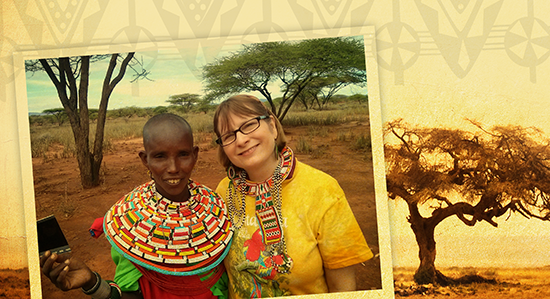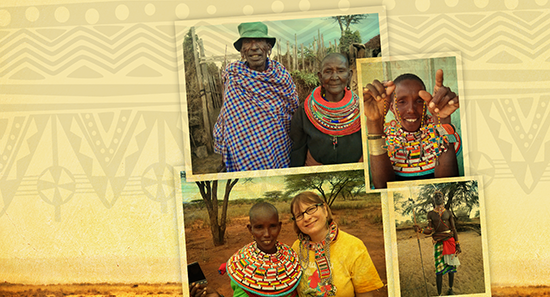
October-November 2015
The Road Ahead
------------------
|






Why the Samburu?
By Eddy Simmons
Why has Free Will Baptist International Missions appointed missionaries to the Samburu people of Kenya? Primarily, because God promised in Revelation 5:9 that He would save people out of “every kindred, and tongue, and people, and nation.” That includes the Samburu people! It is God’s will that people of every culture worship Him around the throne in Heaven. These days, God is calling the Samburu people of Kenya to Himself in a mighty way. Missionaries have been working among them for several decades with some progress. Many women and children have accepted salvation but few men.
Well, things have changed. God is moving and is drawing men, women, and children to Himself. In May, we visited a new area called Ngisiu. We found a new primary school with about 12 students. We met a group of older men, Samburu elders, waiting for others to arrive to discuss community matters. We took the opportunity to share a story from God’s Word, the story of Zakayo (Zacchaeus). When we finished, the men said they were not ready to follow Jesus, but: “We want to hear more about God. When we hear more, we will follow.”
God is at work in the hearts of the Samburu people, and we must hurry to get the gospel to them while they are ready to hear.
In their lostness, the Samburu have chosen a promiscuous lifestyle that has led to a high number of AIDS cases. Diseases such as malaria, typhoid, tuberculosis, etc. also put them at risk for early death. They suffer high infant mortality rates and die from simple medical conditions such as diarrhea, due to lack of access to clean water and good medical care. These present us with a practical and urgent reason to share the gospel with the Samburu.
Because of their remote location in Kenya, good records of their true numbers, mortality rates, or causes of death do not exist. The AIDS rate is likely much higher than the published statistic of 7%. In a very practical sense, we must get the gospel to them quickly—before they die.
That is also a good biblical reason to reach them. Love, compassion, care, and concern for the least among us are strong biblical reasons to reach out to the Samburu people with a sense of urgency. We must seek to reach all of the lost in the world before they die in their sins. So many people have no access to the saving news of Jesus Christ and will spend eternity separated from God unless we reach them with the gospel.
The Samburu have been waiting for someone to bring God’s Word back to them. A Samburu legend says they once knew God and had His Word. They say God gave the white man His Word and the black man His Word. The white man took care of the Word, but the black man was careless and his cow ate the Word. They believe the white man will bring God’s Word back to them. (This legend is repeated in many cultures.) In a sense, they are waiting for someone to bring God’s Word back to their people.

The Samburu are nonliterate for the most part, so the Word must be brought to them in oral form through “chronological Bible storying.” This method is effective, because the Samburu have always passed down heritage and life lessons through stories. Sharing God’s Word in the form of storytelling is natural to them. After hearing it just one time, they are able to retain the narrative and pull deep, spiritual truth from the stories.
They often share these stories from God’s Word with others. The chief and elders of the area asked us to bring God’s Word to them and to live among them. A door for the gospel has opened, and we must walk through it by faith.
The Samburu believe in one God, N’kai, but do not know how to relate to Him. They have been trying to reach N’Kai through prayer, sacrifices, and ritual. They do not know whether or not N’kai hears them or even cares. They have earnestly tried to follow the one true God, but have been missing a vital portion of the story—the story of Jesus. They do not know they must approach God through His Son, Jesus (Yesu in the Samburu language), to be heard and helped. They do not know His one true and final sacrifice, Jesus, reunites them with Him through faith. It is imperative for someone to take the news of Jesus to them.
So, why the Samburu? Because God is moving among them, drawing them to Himself in an extraordinary way, and we must join Him where He is at work!
About the Writer: Eddy and Amanda Simmons currently pastor Faith FWB Church in Matthews, North Carolina. During the April 2015 board meeting, the couple was appointed to work among the Samburu people. Learn more about their ministry.
The Sambur-who?
-
The Samburu people live in north-central Kenya. A semi-nomadic tribe, they primarily herd cattle, sheep, goats, camels, and donkeys.
-
The Samburu have traditional customs and live in mud and dung huts. Two to five families typically form a small settlement. Arid conditions and the sparseness of food and water for their animals keep settlements widely separated.
-
Their religious practices seem Old Testament in nature, consisting of prayer, circumcision, and animal sacrifice to N’kai, their name for God. In some areas, they have an annual sacrifice to commemorate God’s call to Abraham to sacrifice Isaac and His provision of a substitute.
-
The Old Testament practices of the Samburu stem from their belief that they accompanied the Hebrews to Mt. Sinai during the Exodus from Egypt. Since the Samburu are considered a “Nilotic” people, or people who came from the area of the Nile River, this is a distinct possibility. Though they have some knowledge of God, they have no knowledge of Jesus.
-
In spite of the religious rituals the Samburu practice, they often rely upon Laibon (witchdoctors) to ward off evil spirits, heal sickness, and curse enemies. They tend to worship the gods of the mountains and rivers when times are tough.
-
The Samburu currently do not have a written language or a Bible in their language. Progress is being made. However, it will be many years before they have an entire Bible (or learn to read). Therefore, it is necessary to share the gospel using oral Bible storytelling methods.
|
|

